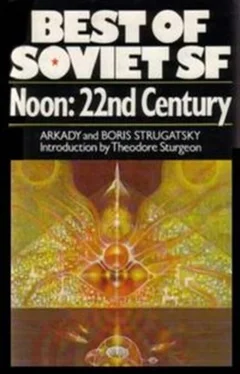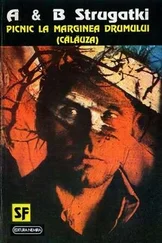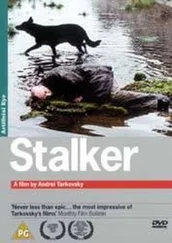The teacher glanced under a bed. The Captain’s knapsack was made up with enviable neatness. Pol’s lay under his bed. Pol’s favorite shirt—red stripes and no collar—stuck out from the knapsack. In the cabinet reposed a ladder skillfully woven from sheets, undoubtedly Athos’s creation.
So… that meant there was some thinking to be done. Teacher Tenin grew gloomy and cheerful simultaneously.
Pol, wearing only shorts, came tearing out of the shower room, saw the teacher, and turned a cartwheel.
“Not bad, Pol!” the teacher exclaimed. “Only keep your legs straight.”
“Zow!” Pol yelped, and cartwheeled the other way. “Teacher, spacemen! Teacher’s here!”
They always forgot to say hello.
The crew of the Galaktion darted into the room and got stuck in the doorway. Teacher Tenin looked at them and thought… nothing. He loved them very much. He always loved them. All of them. All those he brought up and launched into the wide world. There were many of them, and these were the best of all. Because they were now. They were standing at attention and looking at him just the way he liked. Almost.
“K-T-T-U-S-T-X-D,” signaled the teacher. This meant, “Calling crew of Galaktion . Have good visual contact. Is there dust on course?”
“T-T-Q-U-Z-C,” the crew answered discordantly. They also had good visual contact, and there was almost no dust on the course.
“Suit up!” the teacher commanded, and stared at his chronometer.
Without saying anything more, the crew rushed to suit up.
“Where’s my other sock?” Lin yelled, and then he saw the yacht. “You think that’s clever, Polly?” he muttered.
The suiting-up lasted thirty-nine and some tenths seconds,
Lin finishing last. “You pig, Polly,” he grumbled. “Wise guy!”
Then everyone sat down at random, and the teacher said, “Literature, geography, algebra, and work. Right?”
“And a little phys ed too,” added Athos.
“Undoubtedly,” said the teacher. “That’s clear from your swollen nose. And speaking of phys ed, Pol is still bending his legs. Alexandr, you show him how.”
“Okay,” Lin said with satisfaction. “But he’s a little slow, Teacher.”
Pol answered quickly, “Better a somewhat sluggish knee / Than a head full of stupidity.”
“C plus.” The teacher shook his head. “Not too elegant, but the idea is clear. In thirty years maybe you’ll learn to be witty, Pol, but when it happens don’t abuse your power.”
“I’ll try not to,” Pol said modestly.
C plus wasn’t so bad, but Lin sat there red and sulky. By evening he would have thought up a rejoinder.
“Let’s talk about literature,” Teacher Tenin proposed. “Captain Komov, how is your composition feeling today?”
“I wrote about Gorbovsky,” the Captain said, and fished in his desk.
“A fine topic!” said the teacher. “I hope you’ve been equal to it.”
“He’s not equal to anything,” Athos declared. “He thinks that the important thing about Gorbovsky is the know-how.”
“And what do you think?”
“I think that the main thing about Gorbovsky is the daring, the courage.”
“I would suppose you’re wrong, Navigator,” said the teacher. “There are very many daring people. And among spacemen you won’t find any cowards. The cowards simply die out. But the Assaultmen, especially ones like Gorbovsky, are unique. I ask you to believe me because I know, and you don’t, not yet. But you’ll find out, Navigator. And what did you write?”
“I wrote about Doctor Mboga,” said Athos.
“Where did you find out about him?”
“I gave him a book about flying leeches,” Pol explained.
“Wonderful, boys! Have you all read the book?”
“Yes,” said Lin.
“Who didn’t like it?”
“We all liked it,” Pol said with pride. “I dug it out of the library.”
He of course had forgotten that the teacher had recommended that book to him. He always forgot such details—he very much liked to “discover” books. And he liked everyone to know about this. He liked publicity.
“Good for you, Pol!” said the teacher. “And you, of course, wrote about Doctor Mboga too?”
“I wrote a poem!”
“Oho, Pol! And aren’t you afraid?”
“What is there to be afraid of?” Pol said blithely. “I read it to Athos. The only things he complained about were trivia. And just a little bit.”
The teacher looked doubtfully at Athos. “Hmm. As far as I know Navigator Sidorov, he is rarely distracted by trivia. Well see, we’ll see. And you, Alexandr?”
Lin silently thrust a thick composition book at the teacher. A monstrous smudge spread over the cover. “Zvantsev,” he explained. “The oceanographer.”
“Who is that?” Pol asked jealously.
Lin looked at him with shocked contempt and remained silent. Pol was mortified. It was unbearable. It was awful. He had never so much as heard of Zvantsev the oceanographer.
“Well, great,” the teacher said, and gathered up the composition books. “I’ll read them and think about them. We’ll talk about them tomorrow.”
He immediately regretted saying that. The Captain was so visibly discomfited by the word “tomorrow.” To lie, to dissemble, ran very much against the grain of the boy. There was no need to torture them—he would have to be more careful in his choice of words. After all, they were not planning anything bad. They were not even in any danger—they would get no farther than Anyudin. But they would have to come back, and that would really hurt. The whole school would laugh at them. Kids were sometimes malicious, especially in cases like this, where their comrades imagined that they could do something that others couldn’t. He thought of the great scoffers in Rooms 20 and 72, and about the jolly smallfry who would jump with a whoop upon the captive crew of the Galaktion and tear them limb from limb.
“Speaking of algebra,” he said. (The crew smiled. They very much liked that “speaking of.” It seemed to them so enthrallingly illogical.) “In my day one very quaint instructor gave the lectures on the history of mathematics. He would stand by the board”—the teacher started to demonstrate—”and begin, ‘Even the ancient Greeks knew that (a+b) 2equals a 2plus 2ab plus—’” The teacher looked at his imaginary notes. “‘Plus… uhhh… b 2.’”
The crew broke out into laughter. The seasoned spacemen looked at Teacher. They were in raptures. They thought this man was great and simple, like the world.
“But now look at what curious things sometimes happen with (a+b) 2,” the teacher said, and sat down. Everyone crowded around him.
There began that without which the crew could no longer live and the teacher would not want to—the adventures of numbers in space and time. A mistake in a coefficient threw a ship off course and plunged it into a black abyss from which there would be no return for the man who had put a plus instead of a minus before the radical; a cumbersome, horrible-looking polynomial broke up into astonishingly simple factors, and Lin yelped in distress, “Where were my eyes? How simple!”; there resounded the strange, solemn-funny stanzas of Cardano, who had described in verse his method of solving cubic equations; the incredibly mysterious story of Fermat’s Last Theorem rose up from the depths of history…
Then the teacher said, “Fine, boys. Now you can see: if you can reduce all of your problems in life to polynomials, they’ll be solved. At least approximately.”
“I wish I could reduce them to polynomials,” burst out Pol, who had suddenly remembered that tomorrow he wouldn’t be here, that he had to leave Teacher, perhaps forever.
Читать дальше












